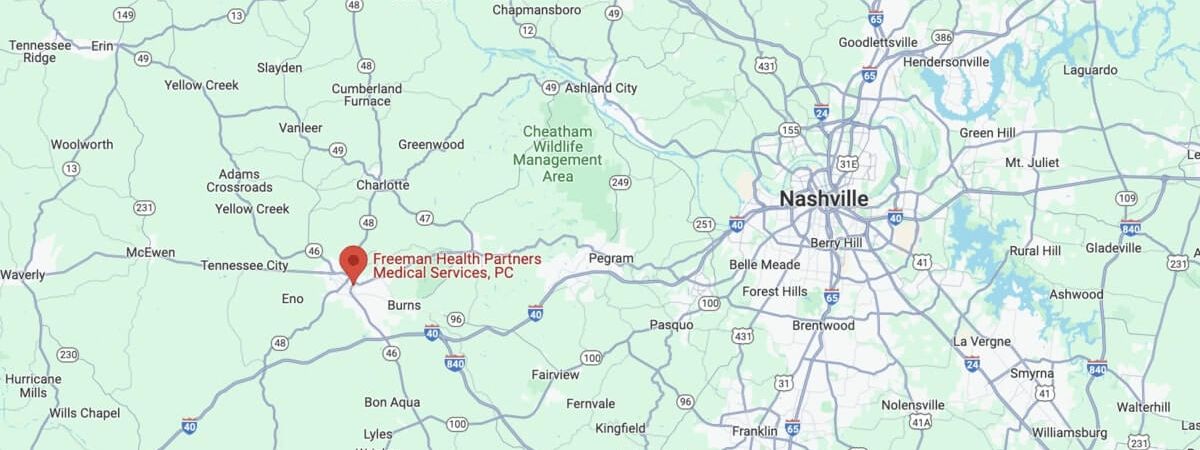Mental Health Therapy and Counseling Services in Nashville, TN
Mental Health Therapy and Counseling Services
Freeman Health Partners offers comprehensive therapy programs alongside primary care services in Tennessee. Located near Nashville, our facility provides a welcoming and supportive environment for people seeking professional mental health treatment. Our experienced team is dedicated to helping patients achieve emotional stability and improved overall well-being.
At Freeman Primary Care, we specialize in therapy programs for mental health, dual diagnosis, and primary care. Whether you’re facing challenges with anxiety, depression, or need integrated care for co-occurring conditions, our tailored therapy programs help meet your precise needs. Our holistic counseling approaches ensure that you receive the highest quality of care in a compassionate setting.

What is Mental Health Counseling and Therapy?
Mental health counseling occurs when a licensed professional helps their client manage symptoms. Most often, counseling occurs in a clinical setting, like an outpatient or inpatient treatment facility. However, unlike medical clinics, counseling services generally have a more inviting and home-like atmosphere.
During therapy in Nashville, a person will talk to their therapist about concerns and symptoms. The sessions can focus on issues relating to specific circumstances. These situations could include grief and loss, substance misuse, or addressing a phobia. Furthermore, counseling, along with psychiatric medications, is the most common treatment for mental health disorders. There are several types of counseling available, including individual counseling in Nashville, TN.
What is the Difference Between Mental Disorder and Mental Illness?
The terms “mental disorder” and “mental illness” are often used interchangeably, but there are subtle differences. A mental disorder refers to a broad range of conditions that affect mental functioning, while mental illness typically describes more severe or clinically diagnosable conditions that significantly disrupt a person’s ability to function in daily life.
Mental disorders encompass a wide spectrum, including mild anxiety or depression that may not meet the threshold for a formal diagnosis. In contrast, mental illness generally refers to more serious conditions such as schizophrenia, bipolar disorder, or major depressive disorder that require professional intervention. Understanding these distinctions can help in identifying the appropriate level of care and support.
Understanding Mental Health Disorders
Mental health disorders are conditions that impact a person’s thinking, feeling, mood, or behavior. These disorders can impact daily functioning and overall well-being, ranging from anxiety and depression to more complex conditions like bipolar disorder and schizophrenia. Early diagnosis and treatment are crucial in managing symptoms and improving quality of life.
Mental health disorders are influenced by a combination of genetic, environmental, and psychological factors. They can manifest in various ways, including changes in mood, behavior, and cognition. Rehabilitation typically involves a combination of therapy, medication, and lifestyle changes. With proper care, many people with mental health disorders lead fulfilling lives.
Mental Health Therapy and Counseling Programs in Tennessee That Accept Private Health Insurance
Freeman Health Partners offers comprehensive mental health therapy and counseling programs throughout Tennessee, accepting most private health insurance plans. Our custom-built mental health services ensure you receive the care you need, close to home. For more information about our programs in Dickson and what we treat, call us today at (615) 879-3582.

Mental Health Therapy Services in Dickson, TN
Freeman Health Partners provides top-quality mental health therapy services in Dickson, TN, at our welcoming facility located at 222 State Street. Our experienced team is dedicated to offering personalized care to help you achieve emotional stability and well-being. Conveniently situated in the heart of Dickson, we’re here to support your mental health journey.
Psychiatric Counseling Programs in Dickson, TN
Freeman Health Partners offers expert psychiatric counseling programs at our facility in Dickson, TN, located at 222 State St, Dickson, TN 37055. Our compassionate counselors provide specific and professional counseling support to help you manage and overcome mental health challenges. Conveniently located, our Dickson facility is committed to delivering high-quality psychiatric care in supportive counseling environments.
How to find Mental Health Counseling and Therapy Options Near Me
To locate mental health counseling and psychiatry services in your area, follow these steps:
- Search Online: Use search engines and dedicated websites to find local mental health providers and services. Make sure to read reviews and check the credentials of the professionals you find. Use search terms like, “counseling Nashville,” “therapy Nashville,” therapy near me,” or “counseling near me.”
- Explore Treatment Directories: Websites like Psychology Today and SAMHSA offer detailed listings of mental health professionals in your region. These directories often include filters to help you narrow down your search based on specific needs.
- Consult Local Healthcare Providers: Contact your primary care physician or nearby clinics for recommendations on mental health assessment and services. They can provide personalized suggestions based on your health history and needs.
- Request Referrals: Ask friends, family, or colleagues for recommendations on trusted therapists and counselors. Personal experiences can help you find a provider who is a good fit for you.
- Verify with Insurance Providers: Check with your insurance company to obtain a list of covered mental health professionals in your area. This ensures that you receive care that is financially manageable.
- Join Support Group Meetings: Attend local support groups, which can be a great way to get referrals for mental health services. These groups also offer additional support and resources for your mental health journey.
- Utilize Helplines and Hotlines: Reach out to national and local mental health helplines for information and service referrals. These resources can provide immediate assistance and guide you to appropriate local services.
- Connect with Mental Health Organizations: Contact local mental health organizations or community centers for goal-oriented counseling services or provider recommendations. These organizations often have connections with a network of mental health professionals.
Free Mental Health Assessments
Common Mental Health Disorders Treated with Therapy and Counseling Programs in Dickson, TN
Therapy and client-centered counseling can be useful in treating many common mental health ailments. Here are some of the most common types of mental health disorders.
- Depression is one of the most common mental health disorders treated with therapy and solution-focused counseling. Characterized by persistent feelings of sadness, hopelessness, and a lack of interest in activities, depression can significantly impair daily functioning. Therapeutic approaches like cognitive-behavioral therapy (CBT) help you challenge negative thought patterns and develop coping strategies, while counseling provides emotional support and psychotherapeutic guidance.
- Anxiety disorders, including generalized anxiety disorder, panic disorder, and social anxiety, are also frequently treated through therapy and counseling evaluation. These disorders involve excessive worry, fear, or panic that can disrupt daily life. Treatment often includes exposure therapy, mindfulness techniques, and evidence-based counseling to address the underlying causes of anxiety and to help patients manage their symptoms more effectively.
- Bipolar disorder involves extreme mood swings, ranging from depressive lows to manic highs. Psychotherapy and counseling play a crucial role in helping people manage these fluctuations, often in conjunction with medication. Cognitive-behavioral therapy and psychoeducation are commonly used to help patients recognize triggers, develop coping strategies, and maintain stability.
- Schizophrenia is a severe mental illness that affects how a person thinks, feels, and behaves. Treatment typically involves a combination of medication and therapy, such as cognitive-behavioral therapy and family therapy. These therapies aim to help you manage symptoms, improve social skills, and enhance their quality of life.
- Obsessive-Compulsive Disorder (OCD) is characterized by intrusive thoughts (obsessions) and repetitive behaviors (compulsions). Therapy evaluation, particularly exposure and response prevention (ERP), is highly effective in helping patients confront and manage their obsessions without resorting to compulsive behaviors. Counseling also supports patients in dealing with the emotional challenges associated with OCD.
- Post-Traumatic Stress Disorder (PTSD) occurs after exposure to a traumatic event and is marked by flashbacks, severe anxiety, and emotional numbness. Therapy, such as trauma-focused cognitive-behavioral therapy (TF-CBT) or eye movement desensitization and reprocessing (EMDR), helps clients process their trauma and reduce the intensity of PTSD symptoms.
- Attention-Deficit/Hyperactivity Disorder (ADHD), often diagnosed in childhood but persisting into adulthood, affects attention, impulsivity, and hyperactivity. Therapy and coping skills counseling for ADHD typically focus on behavior management, organizational skills, and coping mechanisms, helping patients improve their focus and productivity in daily life.
Signs a Person Needs Counseling
Sometimes, a person doesn’t know they could benefit from therapy in Nashville. They could be minimizing their issues or unaware of a problem. Others are masking their symptoms with substance misuse or other unhealthy behaviors. Also, some with long-term mental health disorders could experience a “flare-up” or relapse in symptoms.
The following are signs that a person could benefit from our counseling in Nashville, Tennessee:
- Difficulty focusing or concentrating
- A decline in performance at school or work
- Overwhelming feelings of shame, guilt, or anxiety
- Problems dealing with grief and loss
- Trouble managing stress resulting in anger issues or health problems
- Having panic attacks
- Relationship problems with a partner or other loved ones
- Feeling a lack of motivation
- Loss of interest in pleasurable activities
- Difficulty stopping compulsive behaviors
- Emotional problems resulting from traumatic events
- Misusing drugs or alcohol to manage stress or other mental health symptoms
Oftentimes, significant life changes can trigger mental health symptoms. These can be both negative and positive events. For example, becoming a parent can be life-changing and bring joy to a person’s life. At the same time, this can be challenging and cause increased stress. Individual counseling in Nashville, TN is beneficial to anyone who is having a difficult time navigating a specific situation or set of emotions.
Statistics and Information on Mental Health Therapy and Counseling Services in Tennessee
Tennessee is home to 1,923 licensed Mental Health and Substance Abuse Services (MHSAS) sites, providing crucial support across the state. Despite this, the annual average prevalence of past-year Serious Mental Illness in Tennessee adults is 5.1%. While 89.4% of Tennesseans have some form of insurance, the state ranks 44th in the nation for adverse childhood experiences (ACEs).
Alarmingly, 25.6% of adults with depression and/or anxiety in Tennessee were unable to access emotional well-being counseling or cognitive therapy. These statistics highlight the ongoing need for accessible mental health services in the Volunteer State.
Does Health Insurance Cover Mental Health Therapy and Counseling Near Nashville, TN?
Yes, health insurance often covers mental health therapy. Most insurance plans, including those provided under the Affordable Care Act, are required to offer coverage for mental health services, including therapy and counseling. This coverage is typically on standard with medical and surgical benefits, meaning that mental health care is accessible to those who need it.
However, the extent of coverage can vary depending on the specific insurance plan. Some plans may cover a limited number of therapy sessions, require co-pays, or have specific in-network providers. It’s important to review your insurance policy and consult with us at Freeman Mental Health to understand the details of your mental health coverage. In some cases, supplemental insurance or sliding scale fees may be available to help with costs.
Does Health Insurance Cover Psychiatric Counseling?
Yes, health insurance typically covers psychiatric counseling. Most insurance plans, including those under the ACA, are required to provide coverage for mental health services, including psychiatric counseling. This guarantees that people can access necessary care for mental health conditions, often with coverage similar to other medical services.
The specifics of coverage can vary by plan, including the number of sessions covered, co-pays, and whether the provider is in-network. Some plans may require pre-authorization for psychiatric counseling or have limitations on the types of therapy covered. It’s essential to review your insurance policy and reach out to the Freeman Mental Health Program to fully understand the scope of your psychiatric counseling benefits.

Check Your Insurance Coverage For Mental Health Therapy and Counseling
At Freeman Health Partners, we understand the financial concerns that accompany the decision to seek mental health and primary care services. That’s why we’re committed to making our services as accessible as possible by accepting most major insurance providers in Tennessee. This includes Aetna, Carelon, Blue Cross Blue Shield, Cigna, and Humana.
Our goal is to ensure that everyone who needs our help can receive it, regardless of their insurance coverage. We encourage you to take the first step towards better mental health by filling out our online form. This will allow us to determine your health insurance coverage levels for mental health and primary care services. By understanding what services your insurance covers, you can start your journey with confidence, knowing that you have the financial support you need.




Check Your Insurance By Phone

How Much Does Therapy and Counseling Cost Without Private Health Insurance Support?
The cost of therapy and counseling without private health insurance can vary widely depending on the therapist’s credentials, location, and the type of therapy provided. On average, a session with a licensed therapist can range from $75 to $200 per hour. Specialized therapies, such as EMDR or DBT, may be more expensive, potentially costing up to $300 per session.
Group therapy tends to be more affordable, often ranging from $40 to $60 per session. Sliding scale fees are sometimes available based on income, and community mental health centers may offer reduced rates or free services to individuals with financial constraints.
How Much Does Counseling Cost With Private Health Insurance Coverage?
With private health insurance, the cost of counseling is significantly reduced, though it ranges depending on your specific plan. Typically, insurance covers a portion of the session cost, leaving you responsible for a co-pay or coinsurance. Co-pays can range from $20 to $50 per session, while coinsurance may require you to pay 10% to 50% of the session cost.
Some plans cover a set number of sessions per year, while others provide ongoing coverage. It’s essential to check if your therapist is in-network, as out-of-network providers often come with higher out-of-pocket costs. Overall, insurance coverage makes counseling more affordable and accessible for many people.
How To Get Insurance To Pay For Mental Health Therapy and Counseling in Middle Tennessee
Getting insurance to cover mental health therapy and counseling in Middle Tennessee involves a few key steps. First, review your insurance policy to understand your mental health benefits and any requirements for coverage, such as pre-authorization or referrals. Next, choose an in-network provider to ensure maximum coverage.
Keep thorough records of your therapy sessions and any communications with your insurance company. If you encounter issues, don’t hesitate to appeal decisions or seek help from your provider’s billing department. For personalized assistance in what we treat and to explore your options, contact us at Freeman Recovery Center at (615) 879-3582. We’re here to help you navigate the process and ensure you get the care you need.
What Types of Mental Health Therapies and Counseling Services Are Offered by Freeman Health Partners
Freeman Health Partners offers a wide range of mental health therapies and counseling services tailored to individual needs. Our expert team provides assessment and treatment with Cognitive Behavioral Therapy (CBT), Psychodynamic Therapy, and Transcranial Magnetic Stimulation (TMS) Therapy, among others. Explore our diverse therapeutic counseling service options, including EMDR, DBT, and more, to find the best fit for your needs.
Cognitive Behavioral Therapy (CBT)
Cognitive Behavioral Therapy (CBT) is a structured, goal-oriented therapy that helps you identify and change negative thought patterns and behaviors. By focusing on the relationship between thoughts, feelings, and actions, CBT equips patients with practical skills to manage anxiety, depression, and other mental health conditions, promoting healthier coping strategies and improved emotional well-being.
Psychodynamic Therapy
Psychodynamic therapy explores how unconscious thoughts and early life experiences shape current behavior and emotions. By delving into past experiences and unresolved conflicts, this therapy helps uncover underlying issues contributing to mental health struggles. It helps people gain insight into their inner world, fostering personal growth and emotional healing through a deeper understanding of themselves.
Transcranial Magnetic Stimulation (TMS) Therapy
Transcranial Magnetic Stimulation (TMS) Therapy is a non-invasive treatment that uses magnetic fields to stimulate nerve cells in the brain. It is particularly effective for individuals with depression who have not responded to traditional therapies. TMS targets specific brain regions to improve mood and alleviate symptoms, offering a promising option for those seeking alternative psychiatric treatments.
Eye Movement Desensitization and Reprocessing (EMDR) Therapy
Eye Movement Desensitization and Reprocessing (EMDR) Therapy is designed to help people process and heal from traumatic experiences. Through guided eye movements and other forms of bilateral stimulation, EMDR helps reprocess distressing memories, reducing their emotional charge. This therapy is effective for treating PTSD, anxiety, and other trauma-related conditions, promoting recovery and emotional well-being.
Dialectical Behavior Therapy (DBT)
Dialectical Behavior Therapy (DBT) is a specialized form of cognitive-behavioral therapy that focuses on teaching skills in four key areas: mindfulness, distress tolerance, emotion regulation, and interpersonal effectiveness. It is particularly effective for patients with borderline personality disorder and other conditions involving intense emotions. DBT helps patients build coping strategies and improve emotional resilience.
Individual, Group and Family Therapy
Individual, group, and family therapy offer diverse approaches to mental health treatment. Individual therapy provides personalized support, while group therapy fosters connection and shared experiences among peers. Family therapy services address dynamics and communication within the family unit. Each approach meets specific needs, promoting holistic healing and growth through tailored therapeutic interventions.
Trauma-Focused Therapy
Trauma-focused therapy is designed to help the healing process from traumatic experiences. It involves therapeutic techniques and personalized counseling interventions specifically aimed at addressing the impact of trauma on a person’s emotional and mental well-being. By focusing on the trauma, this therapy assists clients in overcoming their distress and developing healthier coping mechanisms for long-term trauma recovery.
Solution-Focused Brief Therapy (SFBT)
Solution-focused brief therapy (SFBT) is a goal-oriented approach that emphasizes finding solutions rather than dwelling on problems. It helps you identify your strengths and resources to create practical strategies for achieving desired outcomes. By focusing on what is working and setting actionable goals, SFBT fosters rapid progress and effective problem-solving in a brief therapy format.
Acceptance and Commitment Therapy (ACT)
Acceptance and commitment therapy (ACT) encourages you to accept your thoughts and feelings rather than fighting them. By focusing on mindfulness and aligning actions with personal values, ACT helps you build psychological flexibility. This approach promotes living a meaningful life despite challenges, making it effective for conditions like anxiety, depression, and chronic pain.

How to Pay for Mental Health Treatment and Counseling Options Near Nashville, TN
Whether you have insurance or not, several methods can help you cover costs at mental health treatment centers Nashville offers. For those with insurance, check your plan for coverage details, copayments, and in-network providers. If insurance isn’t an option, explore flexible payment plans, sliding scale fees, or local community resources for financial assistance.
Additional strategies include applying for grants and scholarships for rehab programs, utilizing employee assistance programs, or starting a crowdfunding campaign. Using personal savings or seeking family support can also provide necessary funds. These approaches can provide you access to the mental health care you need, regardless of your insurance situation.
Should I Pay for Mental Health Services and Therapy If I Don’t Have Commercial Health Insurance Assistance?
Yes, you should pay for mental health services and therapy even if you don’t have commercial health insurance. Investing in your mental health is essential for overall well-being and quality of life. There are various ways to manage costs, such as exploring flexible payment plans, seeking sliding scale fees, or finding local community resources and charity options.
Additionally, you might consider grants, scholarships, or employee assistance programs. Mental health care can significantly improve your emotional stability and performance, making it a worthwhile investment. Addressing these needs proactively can lead to better long-term results and enhance your overall health and productivity.
Does Private Health Insurance Cover Mental Health Therapy and Counseling Programs Near Nashville, TN?
Freeman Mental Health offers a variety of mental health therapy and addiction counseling programs covered by private health insurance. These include Intensive Outpatient (IOP) therapy and treatment programs, Partial Hospitalization (PHP) treatment and therapy programs, and outpatient treatment with therapy programs. Each program is designed to meet different levels of care needs.
IOP Mental Health Programs
Intensive Outpatient Programs (IOP) provide structured therapy and treatment for people who need more support than traditional outpatient care but do not require inpatient hospitalization. IOPs generally involve multiple therapy sessions each week, focusing on skill-building, coping strategies, and relapse prevention. This flexible option allows patients to maintain daily responsibilities while receiving intensive mental health support.
PHP Mental Health Programs
Partial Hospitalization Programs (PHP) offer a higher level of care for those requiring more intensive treatment than outpatient services but who do not need full-time inpatient care. PHP provides comprehensive therapy and support throughout the day, including group therapy, individual counseling sessions, and medical monitoring, allowing patients to return home in the evenings while receiving robust, structured treatment.
Outpatient Mental Health Programs
Outpatient treatment with therapy programs provides flexible mental health care for people who can manage their daily activities but still need regular therapeutic support. These programs typically involve scheduled therapy sessions, such as individual or group counseling, tailored to the patient’s needs. Outpatient care allows for ongoing treatment while patients continue to live at home and maintain their routines.
Check Your Insurance Coverage
Find out your health insurance coverage levels for by calling the number below.
- A&D Assessments Nashville, TN
- CBT Therapy Nashville
- Dialectical Behavioral Therapy TN
- Nashville Family Therapy Program
- Medication Assisted Treatment (MAT)
- Medication Management Nashville
- Programs for Mental Health Treatment
- Mental Health Intervention
- Mental Health Outpatient Program
- PHP Adolescent Program
- Primary Healthcare Clinician TN
- Private Mental Health Treatment
- Psychiatric Services Nashville
- Residential Treatment Tennessee
- Mental Health Therapy & Counseling
- TMS Therapy Nashville, TN
- EMDR Therapy Nashville, TN
- Addiction Counseling Program
Mental Health Therapy and Counseling Statistics in the Volunteer State
- There are 1,923 licensed MHSAS sites in TN
- The annual average prevalence of past-year Serious Mental Illness in Tennessee in adults was 5.1%
- 89.4% of people in the Volunteer State had some form of insurance
- Tennessee ranks 44th in the nation in rates of adverse childhood experiences (ACEs)
- 25.6% of TN adults with depression and/or anxiety were unable to get counseling or therapy

